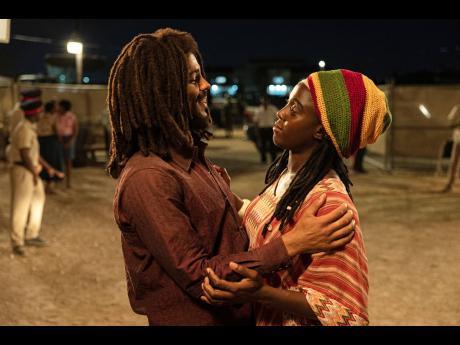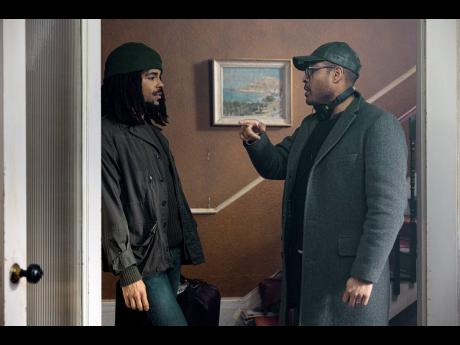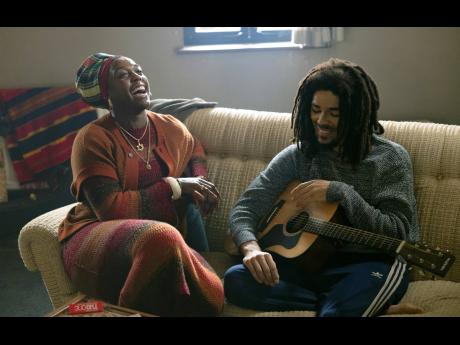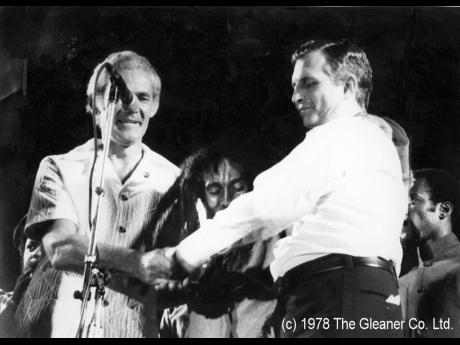Love is king in ‘Bob Marley: One Love’
Arguably, not since Jimmy Cliff’s 1972 debut in The Harder They Come classic has there been a production filmed in Jamaica that has captured the imagination of not only the citizens of this fair isle of wood and water but that of the entire world. This is a film of four protagonists, held together by love. In truth, what puts Bob Marley: One Love on its own level is the depth of performances from its two main protagonists Kingsley Ben-Adir (the titular Bob Marley) and Lashana Lynch (Rita Marley). Love is the main character here. Whether it’s the grown, hard love of marriage and commitment, this man’s music, or a country that he so loved that he had to leave it. It all uncovers a hitherto unseen side of Jamaica’s favourite son, Robert Nesta Marley.
This film carefully examines the core relationship of Bob and his wife, Rita, and the effect of the former’s rising superstar status. There are no bit players here. Though Bob’s lyrics are the underlying bricks and mortar of the film, Lynch’s beautifully fully-fleshed out Rita, all-knowing, yet always steady, elevates her as a mother to the relatively new independent Jamaican nation.
Let’s not forget that Bob passed at the height of his powers and Rita continues to live on as the matriarch of the Marley legacy. Their core relationship and the depiction of two black lovers from teenage sweethearts to man and wife is something not usually promoted in Hollywood and will no doubt be, for most audiences, a radical innovation. As students of director Hsiao-Hsien Hou’s Three Times will appreciate, the telling of the Marley’s love story jumps around in time. Such a device builds on the couple’s progression as an emotional force binding them together.
Onscreen we are given full access to the man behind the music, Bob’s huge vulnerabilities and fears. Anxieties not just for himself and the growth of his own living mythology, but the worry of what such unelected power meant for the welfare of him and his family. Clearly, the director, Reinaldo Marcus Green is a pupil of Sergei Eisenstein, as he weaves his camera wand, leaving the real pain and emotion in the cut and off the screen. That’s not to say that we ever see a ‘soft’ Bob, but we see an emotionally-intricate Marley, never faltering in his desire to be his own man, never buying into the hype of his growing fame or his own mortality.
Alongside the performances, rarely has Jamaica looked so inviting or innocent on screen. From the coastal expanse of Bull Bay to Kingston’s skyline, the country has never looked so gloriously serene on film. Where Cary Joji Fukunaga’s 2021 No Time To Die, gave Jamaica a discreet but cool bit part, Jamaica remains the firm third main protagonist in the film.
One Love covers a brief slither of time from when the titular hero, Marley, left Jamaica in 1977, following the assassination attempt on his life in December 1976. After physically facing his would-be killers, he went to London, which was facing its own social and cultural upheaval, to record Exodus. Here, in the full reflection of the film and his love of the sport, think of Bob as a football manager, wanting his ‘team’ (Jamaica) to win, yet it keeps letting itself down.
“Exodus means movement of Jah people,” clarifies Skip Marley when he meets The Sunday Gleaner in his downtown Miami studio. He’s the son of Cedella Marley, the film’s co-producer and grandson of Bob. The Sunday Gleaner sits while Skip perches casually on the studio’s mixing desk. “Exodus is a call to humanity. All of Jah people on the ert’ (earth) coming together, moving out of Babylon.”
Bob Marley is characterised here as the adamant messenger for his music. His lack of material need and ultimate simplicity amplified his persona of the ‘Poor People’s Pope’ to all. One scene exemplifies this point, as a bemused record executive is unable to understand why Marley didn’t care that his name and image wasn’t emblazoned on the soon-to-be-released Exodus album cover.
The film works as an acute historical observation as well. It clearly clarifies that to the forces of the state and those who desired political dominion, they rankled against Marley’s message of peace, fraternity and love among his fellow countrymen. His love was too radical a step for the post-colonial power structures on the island. Marley, surreally, became the central rallying point for the warring political factions of the Jamaica Labour Party (JLP) and People’s National Party (PNP) that were tearing the country apart. This much is evidenced by his return to Jamaica as the Prodigal Son to bring the country together for his Unity concert. Here, though not shown in live action, Marley brought the PNP’s Michael Manley and the JLP’s Edward Seaga on stage and united them as only a Rastafarian could.
Make no mistake, Bob Marley: One Love is an instant classic. It is an artistic endeavour, that like a rising tide elevates all boats on its water. Think of Angela Bassett and Laurence Fishburne as Tina and Ike Turner in 1993’s genre-challenging biopic What’s Love got to Do With it? One Love’s portrayal of Bob and Rita is every bit as powerful. Add in the film’s use of actual Jamaican actors from Hector Roots Lewis (Carlton Barrett), Naomi Cowan (Marcia Griffiths), Anna-Share Blake, also known as Sevana (Judy Mowatt) and even Mutabaruka makes an appearance as an Elder and this movie is an unashamed celebration of Jamaica. With both Cedella and Ziggy, Bob Marley’s children as well as Rita herself acting as producers, it cements One Love as a family affair, a generation in the making. It stands up as multi-layered cinematic art rather than hagiographic film-making.
Marley died aged 36. A cancer-related illness took him away on May 11, 1981. As such, to witness this first hand authenticity and buy-in from the Marley clan, gives all what audiences see onscreen more than a sliver of truth and provenance that Ben-Adir masterfully paints. And please, let us take a moment to ponder the film’s central performance. Marley is skilfully portrayed by relative newcomer, North London’s Ben-Adir and he is a revelatory triumph in the role that will forever resonate on his CV. Of mixed heritage, this is a man who spent many years in theatre and on domestic UK television. Here, he lifts up and lands on the Hollywood A-list with one performance of a lifetime. Ben-Adir brings a new kind of intense authentic swagger to this, one of his most high profile roles. Think of him as a St. Elsewhere-era Denzel Washington, mixed with the braggadocios charm of a rising Brando, sprinkled with the home-grown appeal of Daniel Craig and it’s clear why people are speaking of him as a potential James Bond for Generation Z. In One Love, Ben-Adir proves he is a ready-made social media millennial meme waiting to go viral. He is only 37.
Within minutes of seeing him on-screen, he remains undeniably convincing in the titular role. He doesn’t seek to be or mimic Bob but simply, he seeks to channel him. From the voice, stage movement and authentic patois, you soon forget that you’re watching an actor playing a role. He embodies the spirit of our hero for all generations for all time.
Surely given the powerful impact that this film will create and the inevitable long-tail spike in tourism, now is the year that the Jamaican government should bestow the full title of national hero on Bob Marley? It’s long and painfully overdue.
All of which brings us to the film’s final protagonist: the music of Marley itself. It oozes through the pores of every scene like good, hot ital soup: uplifting and reaffirming like a mother’s hug. The film revels in the fact that Marley is Rasta and one with the word. A man who understood the groove innately and rode the rhythm each time he picked up his guitar. From Simmer Down to Redemption Song, Bob’s calming music always chimes in, filling the scene, hitting you full-square in your chest, yet you will feel no pain.
Bob Marley: One Love opens locally in Jamaica, February 14. Exodus by Skip Marley features on the Bob Marley: One Love (Music inspired by the film) soundtrack, which is out now on Tuff Gong/Island Records and streaming platforms.
Toussaint Davy is the former editor of Touch Magazine. His published work, features and credits include BBC Radio 4’s Front Row, The Power List, The Independent, MOBO Magazine, Blues & Soul, The Mirror, The Sun, BBC News, MTV Base and various undisclosed ghostwritten projects.




